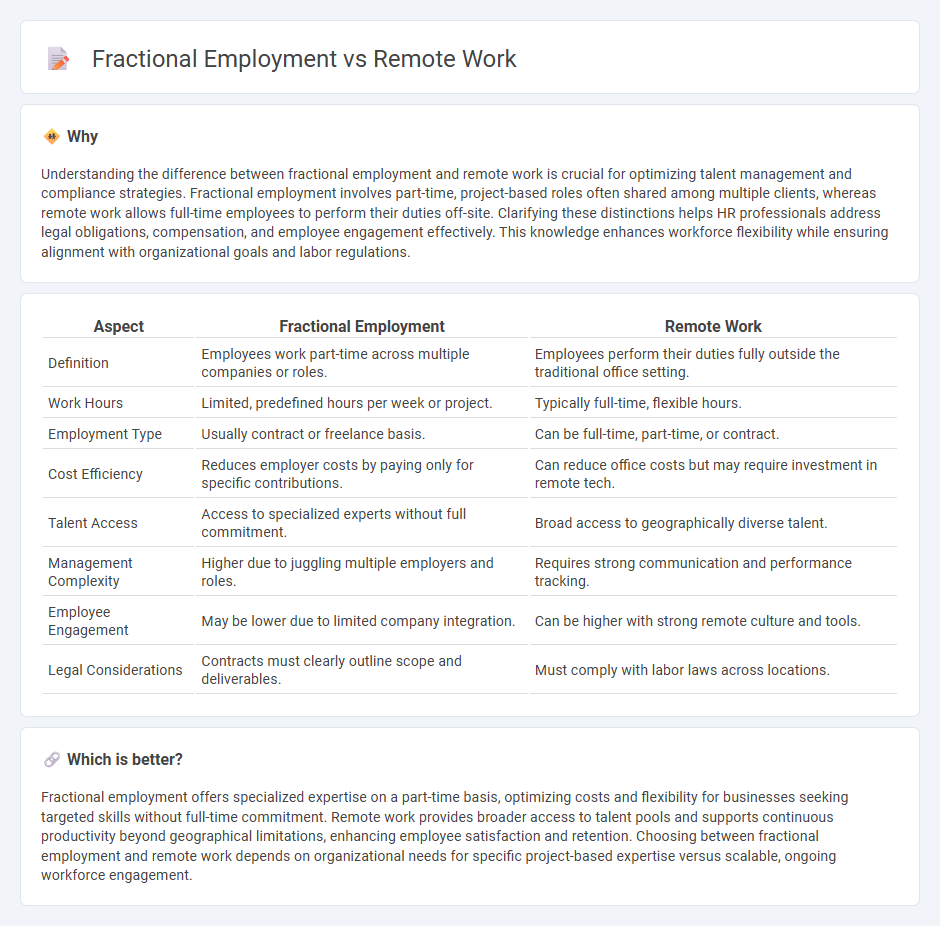
Fractional employment offers companies flexible access to specialized talent on a part-time basis, optimizing workforce costs and project-specific needs. Remote work enables employees to perform their duties from any location, enhancing productivity and work-life balance while fostering a geographically diverse talent pool. Explore how leveraging fractional employment and remote work can transform your Human Resources strategy.
Why it is important
Understanding the difference between fractional employment and remote work is crucial for optimizing talent management and compliance strategies. Fractional employment involves part-time, project-based roles often shared among multiple clients, whereas remote work allows full-time employees to perform their duties off-site. Clarifying these distinctions helps HR professionals address legal obligations, compensation, and employee engagement effectively. This knowledge enhances workforce flexibility while ensuring alignment with organizational goals and labor regulations.
Comparison Table
| Aspect | Fractional Employment | Remote Work |
|---|---|---|
| Definition | Employees work part-time across multiple companies or roles. | Employees perform their duties fully outside the traditional office setting. |
| Work Hours | Limited, predefined hours per week or project. | Typically full-time, flexible hours. |
| Employment Type | Usually contract or freelance basis. | Can be full-time, part-time, or contract. |
| Cost Efficiency | Reduces employer costs by paying only for specific contributions. | Can reduce office costs but may require investment in remote tech. |
| Talent Access | Access to specialized experts without full commitment. | Broad access to geographically diverse talent. |
| Management Complexity | Higher due to juggling multiple employers and roles. | Requires strong communication and performance tracking. |
| Employee Engagement | May be lower due to limited company integration. | Can be higher with strong remote culture and tools. |
| Legal Considerations | Contracts must clearly outline scope and deliverables. | Must comply with labor laws across locations. |
Which is better?
Fractional employment offers specialized expertise on a part-time basis, optimizing costs and flexibility for businesses seeking targeted skills without full-time commitment. Remote work provides broader access to talent pools and supports continuous productivity beyond geographical limitations, enhancing employee satisfaction and retention. Choosing between fractional employment and remote work depends on organizational needs for specific project-based expertise versus scalable, ongoing workforce engagement.
Connection
Fractional employment leverages remote work by allowing employees to contribute part-time hours across multiple organizations without geographic constraints. Remote work platforms and digital communication tools facilitate seamless collaboration for fractional employees, increasing efficiency and talent accessibility. This connection expands workforce flexibility and optimizes human resources management by matching specialized skills with specific project needs globally.
Key Terms
Flexibility
Remote work offers unparalleled flexibility by allowing employees to perform tasks from any location, often accommodating varied schedules that suit individual lifestyles. Fractional employment provides flexibility through part-time or project-based engagements, enabling companies to access specialized skills without committing to full-time roles. Explore in-depth comparisons to understand how each model can enhance workforce adaptability and productivity.
Engagement
Remote work offers flexibility but may challenge sustained employee engagement due to physical distance and potential communication gaps. Fractional employment, leveraging part-time expert involvement, fosters focused engagement through specialized tasks and clear outcome expectations. Explore how businesses optimize workforce productivity by balancing remote flexibility and fractional engagement models.
Cost-effectiveness
Remote work reduces overhead costs by eliminating office space and commuting expenses, offering flexible scalability without long-term commitment. Fractional employment provides specialized expertise at a fraction of the cost of full-time employees, optimizing budget allocation for critical projects. Discover how these models can enhance your business's cost-efficiency and operational agility.
Source and External Links
What Is Remote Work? Ultimate Guide | Wrike - Remote work refers to a professional environment where employees can perform their jobs from home or any location outside their company's physical office, often using digital tools for collaboration.
What is the definition of remote work? - OPM.gov - Remote work is officially defined as a flexible arrangement in which employees, under a written agreement, regularly perform work at an alternative (not agency) worksite and are not expected to return to an office on a recurring basis.
Working Nomads: Remote Jobs - This site curates fully remote job opportunities worldwide, offering full-time, part-time, and contract positions for those seeking to work from anywhere.
 dowidth.com
dowidth.com